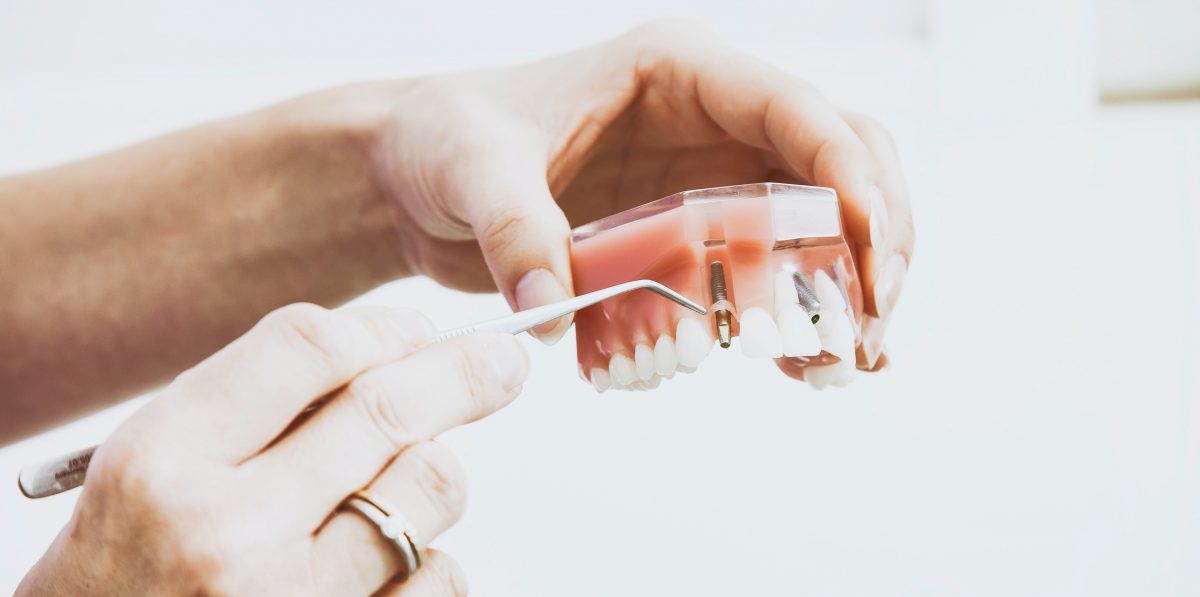Dentures vs. Dental Implants

Missing teeth can not only affect your confidence and self-esteem, they can also have implications for your oral and overall health. Issues caused by missing teeth include, trouble chewing and talking, chronic headaches, and increased risk of oral infections, which can spread through the body, causing serious health issues. Plus, these oral infections are often followed by gum disease, which has been linked to diabetes and heart disease.
Therefore, it’s understandable to be distressed if you have a missing tooth or teeth, but there are a number of restoration options available. In this article, we will be focusing on two of the most common, dentures and dental implants, helping you to determine which one is right for you.
What are Dentures?
Dentures are custom-made, removable dental appliances that replace missing teeth and some gum tissue. They are generally made from a pink acrylic base to blend into the gum tissue, which supports the false teeth. They may also include a lightweight metal frame for extra strength and support.
Depending on how many replacement teeth you need, your dentures will be partial or complete. Partial dentures are used to fill gaps, with clasps or precision attachments around your existing teeth supporting the denture. Complete dentures replace all the teeth in the upper and/or lower jaw and rest directly on the gums.
Pros of Dentures
- One of the cheapest options for tooth replacement
- Dentures are an option for patients who have experienced bone and gum loss
- Non-invasive fitting procedure
- The process to make dentures is fairly quick and requires just a few dentist visits.
Cons of Dentures
- Dentures may be uncomfortable at first and take some getting used to.
- Infections of the mouth and gums can occur if dentures are not properly cared for.
- Adjustment or replacements may be necessary, as face and gum structure changes with age.
What are Dental Implants?
Dental implants are composed of two parts: A titanium rod or screw and a permanent tooth replacement, known as a crown. The rods or screws are fused to your jawbone and act as an artificial root, to which the crown is attached. The result is a permanent replacement that looks just like a natural tooth.
Pros of Dental Implants
- A high success rate, estimated to be above 95%
- Implants allow the bone to continue to grow and preserve the integrity of your jaw bone and facial structure.
- Great longevity, lasting up to 20+ years.
- Can be cared for as regular teeth.
Cons of Dental Implants
- One of the most expensive options for tooth replacement
- Not everyone is a candidate for dental implants as healthy bones and gums are needed to secure the implants.
- Bone and jaw drafts are an option to secure the implant, but they are costly.
Dentures vs. Dental Implants – Important Considerations
It’s important to remember that tooth loss is fairly common and it is not something that is exclusive to the elderly. Tooth loss is increasingly affecting younger individuals. So, when considering a solution to replace your missing teeth, it’s all about what is best for you and your lifestyle.
Here is how each option measures up in a number of important categories:
Price
Dentures are cheaper than dental implants, with the cost of implants depending on the number of teeth being replaced, or if bone and gum grafts are required. However, dentures will need to be replaced as they are not permanent like implants. This has the potential to make dentures more expensive in the long run.
Longevity & Durability
Dental implants come out on top when it comes to longevity. If you take proper care of your implants, there is no reason they can’t last as long as your natural teeth. Dentures, however, usually need to be replaced every five to eight years, less if they are poorly cared for.
Appearance
Dental implants tend to look and feel more natural than dentures, which can sometimes feel bulky in the mouth, at least at first. However, dentures have come a long way in the last few decades, so if yours are made well by a professional, most people won’t be able to tell they aren’t your natural teeth. However, for a more premium set of dentures, there may be a premium price tag.
Comfort
You will get used to dentures after a period of a few weeks or months, but before then, they may feel slightly uncomfortable, with sore gums and excess saliva being common issues. As dental implants are securely fixed to your jawbone, they should feel comfortable and natural within just a few days.
Functionality
There have been great improvements in the fit and feel of dentures, but – particularly with full dentures – they can slip and move inside the mouth. This can make it difficult to speak or eat on occasion.
This is not the case with dental implants. As they are made from titanium they are as strong as your natural teeth, meaning that no foods are off limits.
Oral Hygiene and Oral Health
Dentures need to be cleaned thoroughly each day to prevent the risk of oral infection. By comparison, dental implants can be cared for during your usual oral hygiene regime, brushing and flossing.
Implants are also better for long-term oral health. Chewing with implants helps to preserve bone and prevents gum shrinkage, which reduces the risk of further tooth loss in the future. Dentures don’t have this preserving effect, and in fact a poorly fitted denture may lead to accelerated bone loss.
The Bottom Line
Both dentures and dental implants are a viable option for tooth replacement. If you want something permanent and easy to take care of, then dental implants are probably the best choice.
Dentures are a more cost-effective option, particularly if you have a number of teeth that need replacing. However, they aren’t permanent, require a strict oral hygiene regime, and may take some getting used too.
A consultation with a dentist will help you to determine which tooth replacement method is best for you and your circumstances.


